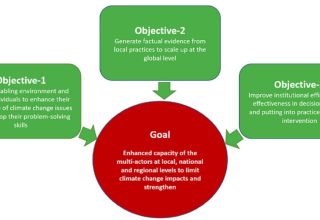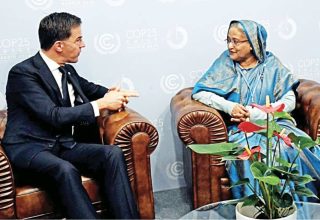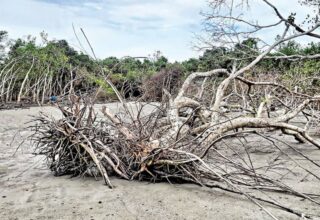
The Asia-Pacific Climate Week was held at the UN Conference Centre, Bangkok from September 2 to 6, 2019. The objective was to have a regional dialogue on how to rachet up ambition in mitigation and speed up adaptation actions. This event has also been held in some other regions. It covered a whole range of issues including adaptation, mitigation, loss and damage, capacity building, climate finance and the role of private sector. The synthesis of the dialogues will be presented at the UN Climate Summit, which will be held today (September 23) in New York.
For us, the key event there was the Knowledge to Action Day, which was held on September 2, jointly organised by the UNFCCC, UNESCAP, the Paris Committee on Capacity Building (PCCB), Stockholm Environment Institute, International Centre for Climate Change and Development (ICCCAD) and the LDC Universities’ Consortium on Climate Change (LUCCC). The importance of knowledge and adequate capacity to implement the Paris Agreement (PA) is given an added impetus in view of the “climate emergency”, as the UN Secretary-General has called it.
The recent record-breaking heat in all regions is a wake-up call loud enough to be responded by the comity of nations. Obviously, the focus of the Knowledge to Action Day was to explore and explicate the role of universities and research institutes in contributing to sustainable capacity building, as some of the Nationally Determined Contributions (NDCs) have identified universities as the main institutional hub for that purpose.
For an effective response to the current climate change, developing countries rightly make the implementation of their NDCs conditional on capacity building (CB)—which is the most frequently requested type of support, even more than climate finance. This continued demand suggests that past CB efforts by development agencies have been insufficient and ineffective. Defining the scope of CB or monitoring the results has proved difficult because of its nature as an umbrella term, which allowed different projects to be packaged as promoting CB. But they have been mostly project-based, short-term, foreign consultancy-driven and workshop-focused ad-hoc initiatives, with no systems of capacity left behind.
CB is not a discrete product, but a continuous process. One of the nine elements of the Work Plan to be coordinated by the Paris Committee on Capacity Building (PCCB), established at COP21, is to explore means of ensuring national ownership. It has also been urged to learn from past experience in CB (paragraph 73.e of the PA). In addition, the Paris Agreement includes CB as one of its main pillars through articles 11 (capacity building), 12 (education, training and awareness) and 13 (transparency). These provisions are indicative of a need for a new approach to CB for implementation of the NDCs.
However, defining the CB needs for addressing the multidimensional problem of climate change is even more challenging. It warrants the building of generic capacities, such as access to education, health services, income opportunities and political participation as well as specific capacities, such as vulnerability assessments, analysis of climate change impacts, costing of adaptation, loss and damage and mitigation options. Following the book of Mizan Khan et al on CB, published by Routledge last year, we suggest that capacity needs for climate change relate broadly to: a) better understanding of the problem, both in its cause and effect dimensions and their assessment; b) ability to formulate and implement national strategies to help limit the problem through mitigation of GHG emissions, and to curb impacts through reducing risks and adapt to them; and c) to analyse, build consensus on and articulate national interests in the UNFCCC negotiations.
We have done an analysis of countries’ priorities of CB in the NDCs, which shows that the elements most frequently indicated are research and technology, education, training, institutional strengthening and awareness raising, mainly in the sectors of agriculture, water, fisheries and energy. The limited in-country capacities partly explain the dominance of foreign experts in implementation of most climate change projects particularly in the LDCs. As mentioned before, the previously supported actions did not pay enough attention to all the elements of CB, covering all the levels and elements. For this purpose, we only share two pillars here for a new framework of CB.
First, universities should be the central hub of CB, as was the consensus in Bangkok. Universities are tested institutions on education, training, public awareness, research and technology development. Historically, as powerful arbiters of knowledge in societies, universities have the ability and minimum logistics needed to generate both generic and specific capacities, creating a synergy for building overall human resources for development and climate change. They have a ripple effect across all segments and sectors, reaching students (through curricula) to supplying graduates and experts, thought leaders and policy makers. Even the small LDCs have at least one university, with a certain level of multi-and-interdisciplinary expertise across disciplines, including environmental science and natural resource management. Together with mainstreaming climate change education, universities also can offer semester-long certificate programmes for stakeholders including government officials and NGO/private sector leaders.
Students through research assignments can become sustainable agents to support M&E to assess the outcomes and impacts of CB, which are more important than some immediate outputs. But this was not the culture before, in the workshop-based practices. As adaptation is mostly locale/region-specific, field-based learning by doing is key to finding locally specific solutions, which combine both indigenous and scientific knowledge.
Second, long-term financing is vital. CB requires dedicated, long-term programmatic support to have a sustainable impact. Although a new approach was agreed by successive multilateral declarations on enhancing aid effectiveness during 2005-2011 in meetings of Paris, Accra and Busan—all emphasising recipient country ownership and mutual accountability—there has not been much change in practices. Our research shows that development agencies usually do not fund education and sustained research in universities, except for short-term research projects. Targeted and sustainable funding is needed for universities to promote all the elements of CB. Together, universities, particularly in the LDCs, should mobilise better resources through university-industry, South-South and South-North partnerships. This is the goal with which the LUCCC was established in 2017 and politically endorsed by all the LDCs in 2018. So, funding for LUCCC member universities should be a prime “ask” from LDC leaders at the UN Climate Summit in New York.
Finally, in this mission, youth capacity building should be the focus, as the youth are the future stewards of their societies. Gobeshona, as a climate change research platform established in Bangladesh a few years ago at ICCCAD’s initiative, is exactly geared to promoting and mentoring young talents for scientific research worthy of publication in peer-reviewed journals. Together, universities must have adequate research funding. Though the government of Bangladesh spends about 10 percent of the budget on CB and research/knowledge management, the outcomes are not yet satisfactory. This warrants development of indicators for CB, which we at ICCCAD are presently working on, and we plan to discuss these issues at the PCCB Hub to be organised at the upcoming COP25 in Chile.
Originally this article was published on September 23, 2019 at The Daily Star. The author Dr. Mizan R Khan is the Deputy Director of International Centre for Climate Change & Development (ICCCAD), and Programme Director of LDC Universities’ Consortium on Climate Change (LUCCC).
Email: mizan.khan@icccad.net






